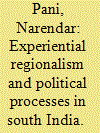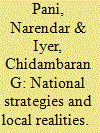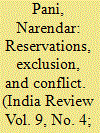| Srl | Item |
| 1 |
ID:
155044


|
|
|
|
|
| Summary/Abstract |
Regional identities have periodically asserted themselves in Indian politics, both before and after Independence. The intensity of this regionalism has, however, tended to vary quite substantially from state to state and over time, ranging from a somewhat benign influence on state politics to demands for secession. These differences are typically explained in terms of specific local political conditions. While the local is undoubtedly important, this article argues that a larger theoretical explanation is also possible: Once we recognize that regionalism operates in multiple spaces, it becomes evident that the way these spaces are experienced has its influence on the practice of local politics. The article goes on to match its theoretical expectations with the politics of regionalism in the neighboring south Indian states of Karnataka and Tamil Nadu.
|
|
|
|
|
|
|
|
|
|
|
|
|
|
|
|
| 2 |
ID:
112108


|
|
|
|
|
| Publication |
2012.
|
| Summary/Abstract |
Despite sporadic attention paid to the case for "shock therapy," the conceptualization of the implementation stage of policy making does not always get the attention it deserves. As a result there is inadequate understanding of the precise role this conceptualization plays in the transformation of a policy initiative into practice. This article draws on some of the insights of Amartya Sen, in another context, to identify different approaches to the conceptualization of the implementation of policy initiatives. It goes on to explore the consequences of using what we have termed the Greenfield approach in a reality marked by diversity in social, economic and political relations. It does so using the experience of the working of the Mahatma Gandhi National Rural Employment Guarantee Scheme in the south Indian state of Karnataka.
|
|
|
|
|
|
|
|
|
|
|
|
|
|
|
|
| 3 |
ID:
101081


|
|
|
|
|
| Publication |
2010.
|
| Summary/Abstract |
Caste-based reservations (quotas) in government jobs and admissions to educational institutions in India have been associated with bouts of sometimes intense social conflict. The debate about this conflict has focused primarily on the case for and against reservations per se. Even when variations have been noticed in the degree of conflict generated by reservations across regions, the tendency has been to attribute the differences to local social conditions. Very little attention has been paid to the question of whether the type of reservations implemented in each region influences the nature and extent of conflict. This article attempts to answer this question by comparing the Mandal Commission Report with the experience of princely Mysore, and later Karnataka. Abstracting from these experiences, the article develops two concepts: reservations with exclusion and reservations without exclusion. It goes on to argue that reservations with exclusion create greater conflict.
|
|
|
|
|
|
|
|
|
|
|
|
|
|
|
|